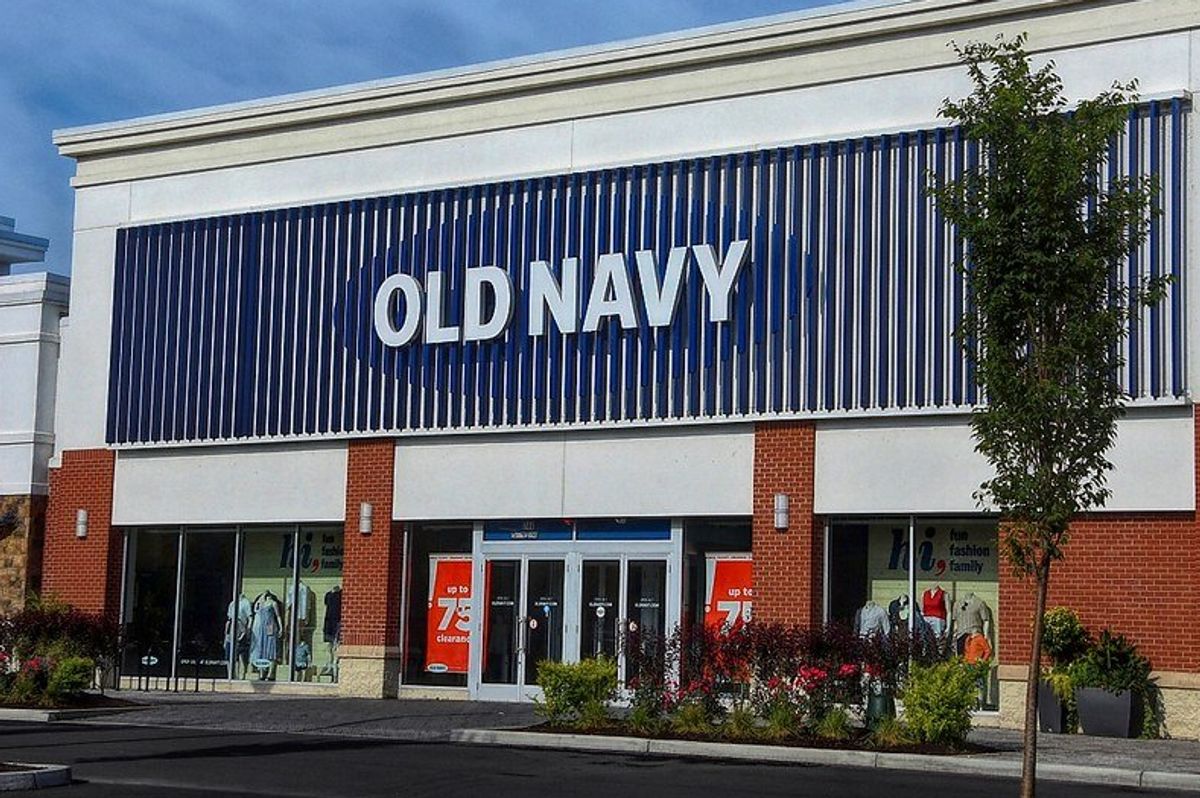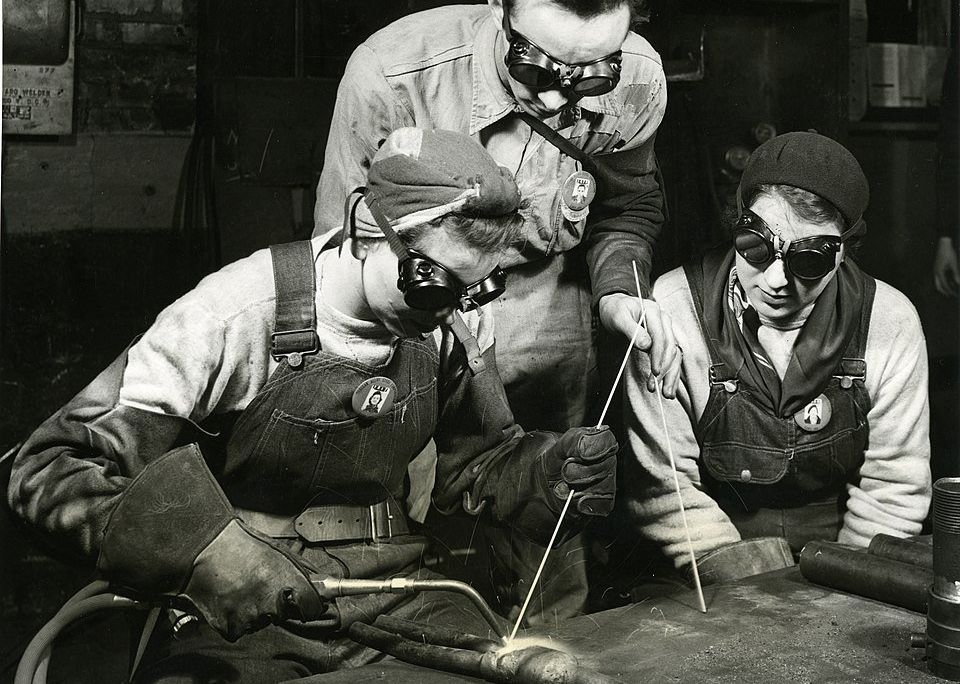Old Navy customers share the not-so-subtle fashion trends that show we're headed for a recession
People are noticing some Hunger Games vibes.

An Old Navy Retail store.
Recent shake-ups in U.S. trade policy have caused many to fear that the United States economy may fall into a recession this year after remaining surprisingly resilient after the COVID-19 pandemic. Recently, J.P. Morgan research raised the probability of a global recession to 40%. On March 19, Federal Reserve Chair Jerome Powell said the chance of an upcoming recession is rising, but the probability is still not high.
Is the economy headed for a recession?
A recession occurs when the economy slows down for two consecutive quarters. The last time the U.S. economy hit a recession was a brief period from February to April 2020 because of the COVID-19 pandemic. Even though the U.S. economy has yet to cross the line into recession, two savvy shoppers at Old Navy believe that the signs are all there when it comes to new clothing on the shelves.
TikToker Zoe (@zoezoezoezand) made her case in a viral video with over 790,000 views. “We're at Old Navy and we're pretty sure that they've got some recession predictors out here, so I'm gonna show you what we're talking about,” she said before pointing out that a frock was giving her Hunger Games vibes.
@zoezoezoezand Old Navy wants us back in the factories y’all #oldnavy #recessioncore #recessionindicator #recession
“We're starting fresh with our District 12 frock, it's made out of a nice uh rough material that's what you want, it's a nice oatmeal color just like you want it,” Zoe jokes. For those of you who aren’t familiar with the Hunger Games series of books and films, District 12, located in Appalachia, was the smallest and poorest of the 13 districts.
Zoe added that another vintage-looking pair of pants was a sign that people will have to quit their cushy service jobs and return to working with their hands soon. “I know what you're thinking, those little pants aren't that bad, and they're not. I actually think they're kinda cute,” she said. “But what do they make you think of? Right, a sailor or perhaps Rosie the Riveter. They're trying to get us prepared to get back out to work.”

What is the Hemline Index?
While shopping at your local Old Navy may not give you the best economic indicators, there has been a correlation between women’s attire and the economy in American history. The “Hemline Index,” a theory that suggests hemlines get higher when the economy is good and lower when it turns sour.
InStyle notes that hemlines rose in the 1920s before the stock market crash that helped lead to the Great Depression in 1929. They rose again during the wartime boom of the 1940s and dropped again during the recession of 1949. A slow and steadily growing economy led to the creation of the mini shirt in the late ‘60s, which once again became longer after the 1987 crash.
Hopefully, the U.S. economy doesn’t go into a recession so that Americans and our friends worldwide don’t have to suffer through the belt-tightening that comes from a downturn. But, interestingly, history shows how today’s styles might indicate tomorrow’s economic signals. Because, as Zoe’s video shows, economies aren’t just random numbers on stock tickers and forecasts but actual indicators of how people think, feel, and behave.
- A new material made from seaweed will transform the entire textile industry ›
- 11 old-timey frugal living habits younger generations need to bring back ASAP ›
- 9 reasons you shouldn't throw away clothes, and 4 things you can do instead. ›
- Here’s a paycheck for a McDonald’s worker. And here's my jaw dropping to the floor. ›
- Elder millennial nails what people get wrong about her generation in the 2008 recession - Upworthy ›
- Business editor nails the fashion trends that's a recession indicator - Upworthy ›
- Woman from Great Depression photo didn't about fame for 40 years - Upworthy ›



 A Generation Jones teenager poses in her room.Image via Wikmedia Commons
A Generation Jones teenager poses in her room.Image via Wikmedia Commons
 An office kitchen.via
An office kitchen.via  An angry man eating spaghetti.via
An angry man eating spaghetti.via 



An Irish woman went to the doctor for a routine eye exam. She left with bright neon green eyes.
It's not easy seeing green.
Did she get superpowers?
Going to the eye doctor can be a hassle and a pain. It's not just the routine issues and inconveniences that come along when making a doctor appointment, but sometimes the various devices being used to check your eyes' health feel invasive and uncomfortable. But at least at the end of the appointment, most of us don't look like we're turning into The Incredible Hulk. That wasn't the case for one Irish woman.
Photographer Margerita B. Wargola was just going in for a routine eye exam at the hospital but ended up leaving with her eyes a shocking, bright neon green.
At the doctor's office, the nurse practitioner was prepping Wargola for a test with a machine that Wargola had experienced before. Before the test started, Wargola presumed the nurse had dropped some saline into her eyes, as they were feeling dry. After she blinked, everything went yellow.
Wargola and the nurse initially panicked. Neither knew what was going on as Wargola suddenly had yellow vision and radioactive-looking green eyes. After the initial shock, both realized the issue: the nurse forgot to ask Wargola to remove her contact lenses before putting contrast drops in her eyes for the exam. Wargola and the nurse quickly removed the lenses from her eyes and washed them thoroughly with saline. Fortunately, Wargola's eyes were unharmed. Unfortunately, her contacts were permanently stained and she didn't bring a spare pair.
- YouTube youtube.com
Since she has poor vision, Wargola was forced to drive herself home after the eye exam wearing the neon-green contact lenses that make her look like a member of the Green Lantern Corps. She couldn't help but laugh at her predicament and recorded a video explaining it all on social media. Since then, her video has sparked a couple Reddit threads and collected a bunch of comments on Instagram:
“But the REAL question is: do you now have X-Ray vision?”
“You can just say you're a superhero.”
“I would make a few stops on the way home just to freak some people out!”
“I would have lived it up! Grab a coffee, do grocery shopping, walk around a shopping center.”
“This one would pair well with that girl who ate something with turmeric with her invisalign on and walked around Paris smiling at people with seemingly BRIGHT YELLOW TEETH.”
“I would save those for fancy special occasions! WOW!”
“Every time I'd stop I'd turn slowly and stare at the person in the car next to me.”
“Keep them. Tell people what to do. They’ll do your bidding.”
In a follow-up Instagram video, Wargola showed her followers that she was safe at home with normal eyes, showing that the damaged contact lenses were so stained that they turned the saline solution in her contacts case into a bright Gatorade yellow. She wasn't mad at the nurse and, in fact, plans on keeping the lenses to wear on St. Patrick's Day or some other special occasion.
While no harm was done and a good laugh was had, it's still best for doctors, nurses, and patients alike to double-check and ask or tell if contact lenses are being worn before each eye test. If not, there might be more than ultra-green eyes to worry about.